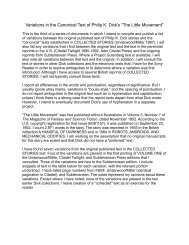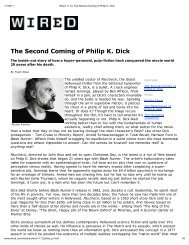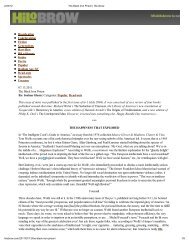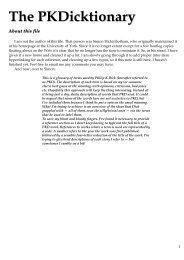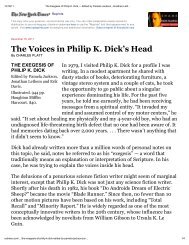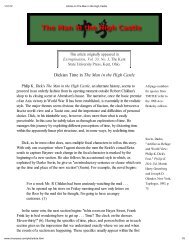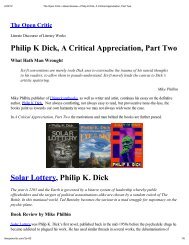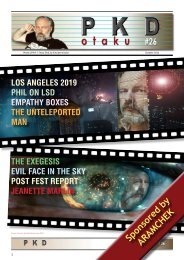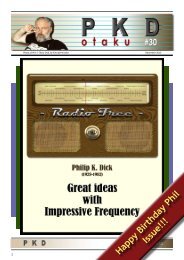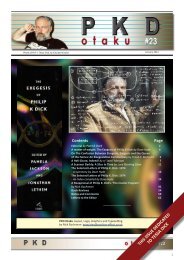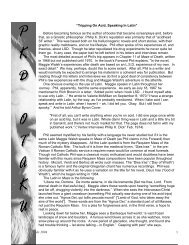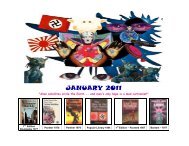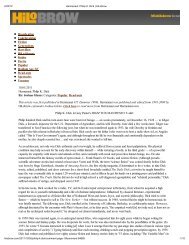PKD Otaku Issue 27 - Philip K. Dick Fan Site
PKD Otaku Issue 27 - Philip K. Dick Fan Site
PKD Otaku Issue 27 - Philip K. Dick Fan Site
Create successful ePaper yourself
Turn your PDF publications into a flip-book with our unique Google optimized e-Paper software.
As for Roberto comparing Phil to Franz Kafka, that is not<br />
so new, though his characterization is certainly vivid and<br />
memorable. Unfortunately, there is no reliable evidence<br />
that Phil took LSD regularly,<br />
thus a “LSD rage”<br />
is unlikely. Brian W. Aldiss<br />
compared Kafka<br />
to Phil years ago, and<br />
the author/illustrator<br />
of the unforgettable<br />
Maus (serialized<br />
from 1980 to 1991 as<br />
an insert in the avantgarde<br />
comic Raw), Art<br />
Spiegelman, has written<br />
“what Franz Kafka<br />
was to the first half of<br />
the twentieth century,<br />
<strong>Philip</strong> K. <strong>Dick</strong> is to the<br />
second half.” The most<br />
relevant, however,<br />
is what Phil himself<br />
wrote in a 5-4-73 letter:<br />
“the middle initial in my name stands for Kindred, my<br />
mother’s maiden name. Kafka would be more apt, perhaps;<br />
maybe not; maybe Kindred is right on.”<br />
Now, if we leave Chile and travel in a northeasterly direction<br />
for approximately 7,300 miles, we’ll reach Switzerland,<br />
wherein Markus Widmer did his Swiss Diploma<br />
Thesis at Universität Zürich in 2000. It is titled Worlds<br />
and Selves Falling<br />
Apart: The Science Fiction<br />
of <strong>Philip</strong> K. <strong>Dick</strong>, (Norderstedt,<br />
Germany: GRIN<br />
Verlag, ISBN 978-3-638-<br />
6990705, softcover, 92<br />
pgs., 2000), and is rather<br />
expensive. Via Amazon<br />
you can get a new copy<br />
for $73.42, and a used<br />
one for $89.45.<br />
This is the first Swiss<br />
Diploma Thesis I have<br />
read and it’s actually<br />
quite interesting.<br />
There is a minimum<br />
of obfuscatory academic<br />
jargon, such<br />
as “ontological<br />
dominant” (p. 3),<br />
“deconstruct the narrative<br />
coherence” (p. 9), or “allegorical renderings<br />
of the condition of subjects” (p. 49). And Markus<br />
tried not to do too much at once by being judicious about<br />
the number of <strong>Philip</strong> K. <strong>Dick</strong> works he considers, seven<br />
novels and two short stories. He even includes a couple<br />
that are rarely written<br />
about, A Maze of<br />
Death and Eye in the<br />
Sky. As he aptly writes,<br />
“An essential criterion<br />
for a selection of <strong>Dick</strong>’s<br />
texts is their diverging<br />
quality.” (p. 6) In so<br />
doing, Markus notes,<br />
“…my particular interest<br />
was to show that<br />
<strong>Dick</strong> managed to be<br />
the more relevant to<br />
the contemporary moment,<br />
the crazier his<br />
science-fiction metaphysics<br />
and allegories<br />
were.” (ibid.)<br />
Better yet, as I have<br />
written on more than one occasion, a very important<br />
statement <strong>Philip</strong> K. <strong>Dick</strong> writes in his writers’ journal, the<br />
unfortunately titled Exegesis, is “I’m a fictionalizing philosopher,<br />
not a novelist.” Markus has apparently noticed its<br />
importance as well, for he writes, “…it is not so important<br />
whether <strong>Dick</strong> has been influenced by this theory or that<br />
philosophy, but what, if any, system can be inferred from<br />
<strong>Dick</strong>’s own texts. His affinity for quoting systems similar to<br />
his own is helpful to point the critic to the right direction,<br />
but it is a fact that <strong>Dick</strong>’s philosophy is<br />
very<br />
idiosyncratic, indeed.” (p. 28)<br />
If Markus (that’s him to the right)<br />
means Phil’s strong interest in, and use<br />
of, philosophy, in particular the Pre-<br />
Socratics, Kant and Spinoza, is peculiar<br />
if not eccentric, I certainly agree.<br />
Phil was, if anything, an autodidact<br />
who owned a set of the inimitable<br />
Encyclopedia of Philosophy, and he<br />
did jump about in trying to find workable<br />
philosophical answers to his two salient themes:<br />
what is reality, what is human-ness. As Markus incisively<br />
indicates, some of these philosophical issues are “…the<br />
boundary between self and world, considering questions<br />
of perception and experience as well as the opposition between<br />
inside and outside.” (p. 48) Also impressive is what<br />
he writes in part in his summation, that “The science-fiction<br />
of <strong>Philip</strong> K. <strong>Dick</strong> does not lend itself to conclusions, for<br />
if his novels and stories have one thing in common, it is<br />
their inconclusiveness.” (p 84)<br />
5 ‘‘An idea out of nothing’



